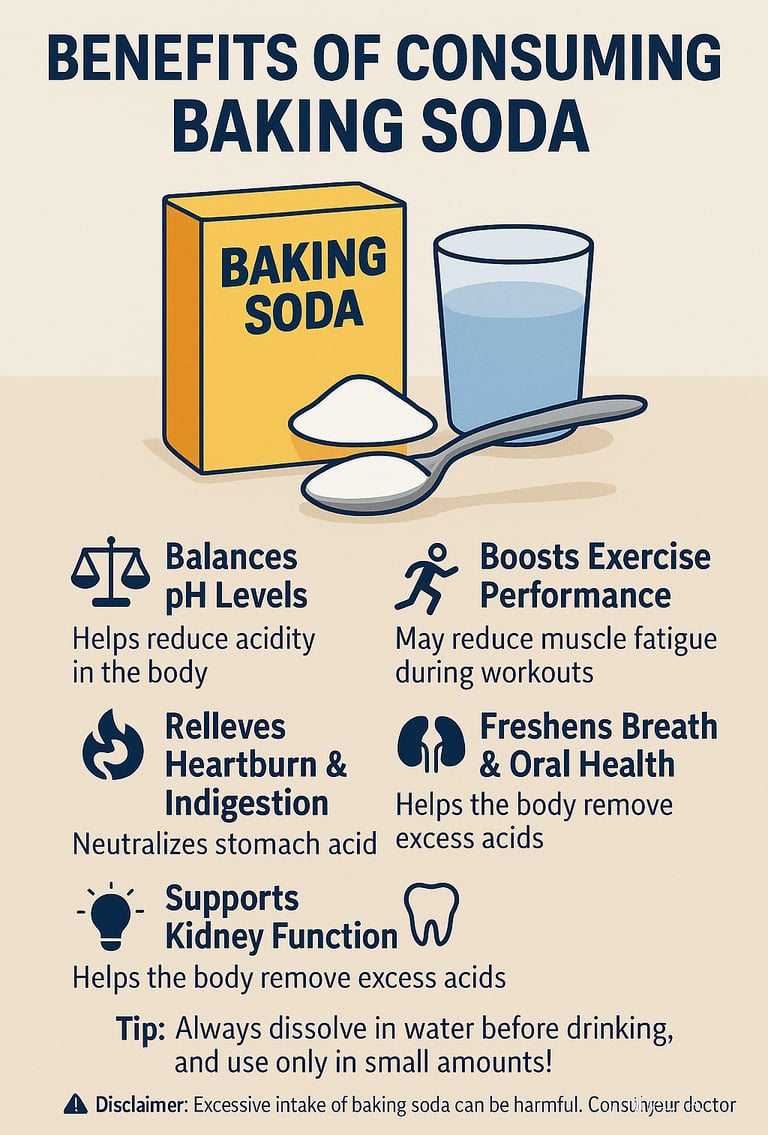The Benefits of Consuming Baking Soda (Food Grade)
Discover the health benefits of food-grade baking soda: digestion, acid-base balance, sports performance, and oral health. Learn how to use it safely.
HEALTHBLOG-LIST
Narcisse Bosso
8/24/20252 min read


In Brief
Baking soda, often used in cooking and as a natural household cleaner, also has interesting health benefits when consumed in small amounts. From digestion and stomach comfort to sports performance and oral hygiene, food-grade baking soda has gained attention as a natural remedy. However, it must be used with caution and never in high doses. Here’s a breakdown of its main benefits and how to use it wisely.
Table of Contents
What Is Food-Grade Baking Soda?
Key Health Benefits
Digestion and Acid Relief
Acid-Base Balance Support
Sports Performance
Oral Health
How to Consume Baking Soda
Precautions and Contraindications
FAQ
Conclusion
What Is Food-Grade Baking Soda?
Baking soda is a white alkaline powder traditionally used as a leavening agent in baking and as a natural cleaner. Its food-grade version is safe for consumption in small amounts and can be used in specific health situations.
👉 Also read: The Benefits of Proper Hydration.
Key Health Benefits
1. Digestion and Acid Relief
Baking soda acts as a natural antacid. It helps relieve heartburn and indigestion by neutralizing excess stomach acid.
2. Acid-Base Balance Support
Moderate consumption helps regulate the body’s acid-base balance, reducing metabolic acidity often linked to diets high in processed foods.
3. Sports Performance
Research shows baking soda can buffer lactic acid during intense exercise, delaying muscle fatigue and improving endurance.
4. Oral Health
When diluted in water, it can be used as an alkalizing mouth rinse, helping reduce bacterial growth and freshen breath.
How to Consume Baking Soda
Dissolve ½ teaspoon in a large glass of water and sip slowly, preferably away from meals.
Do not exceed 1–2 g per day without medical advice.
Athletes: may take it ~60 minutes before exercise (only under professional supervision).
Precautions and Contraindications
Avoid excessive consumption: risk of high blood pressure, electrolyte imbalance, or kidney issues.
Not recommended for people with heart failure, kidney disease, or uncontrolled hypertension.
Always consult a healthcare provider before regular use.
👉 Learn more: How to Prevent High Blood Pressure.
FAQ
1. Is baking soda safe to consume?
Yes, in small amounts and only when using food-grade baking soda.
2. Can it replace antacid medications?
It may help temporarily, but it does not replace prescribed treatments.
3. Can children take baking soda?
Only with medical guidance.
4. Does it help with hangovers?
It may help rebalance acidity, but it won’t counteract alcohol’s effects.
5. Can it whiten teeth?
It has mild abrasive properties, so it may polish teeth slightly — but should only be used occasionally to avoid enamel damage.
Conclusion
Food-grade baking soda is a natural, inexpensive ally for digestion, sports recovery, and oral hygiene. But while it’s easy to find and use, it should always be consumed in moderation and with caution.
💡 Action step: After a heavy meal, try a glass of water with ½ teaspoon of baking soda to relieve stomach acidity.
Scientific Sources
McNaughton LR, et al. Effects of sodium bicarbonate ingestion on exercise performance. Sports Med. 2007.
American Dental Association. Baking soda in oral care.
NIH. Sodium bicarbonate as an antacid.
Written by Narcisse Bosso, certified naturopath. His lifelong passion for health became a profound calling after a loved one passed away from a natural illness that could have been prevented with simple lifestyle changes and habits.
